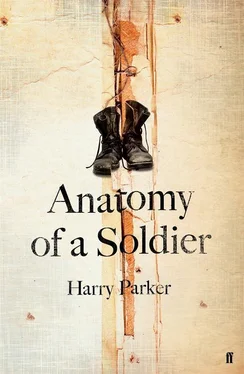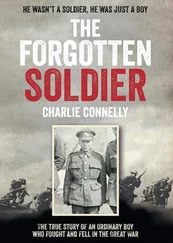Latif felt upset and alone; maybe he was different now. He tried to pull me on but the knots he had tied made it difficult. His mother asked where he was going and told him he couldn’t, it was too late, but he ignored her and continued to struggle with my laces.
She came over and knelt in front of him and picked me up. She undid the knots and her tears fell onto me. Latif waited as she gently slipped me on his foot and tied my laces in a bow, slowly so he could see. She did the same on his other foot and then pleaded with him to stay. But we left the compound and walked out over the dark fields.
They were where he thought they might be, around a fire, and they shuffled to make room and said how great his shoes looked. We were in a ring of men illuminated by the yellow heat. Each one had shoes like me, poking from under their crossed legs.
*
We stayed with these men. We ran errands for them. We helped dig holes in roads that they carefully placed bombs in. Latif was the youngest but he started to feel more confident. He watched them make explosives and helped where he could. He was sent to market to buy more supplies. He spent hours standing guard while the other men did things he wanted to be part of.
Sometimes he would shake with fear and we would run as fast as he could and I would grip around corners as we tore through a maze of paths to get away. Sometimes there would be a motorbike waiting and Latif would leap onto the back and grab hold of the rider. The rear wheel would kick out and we would drive off with a trail of dust behind us as the engine vibrated in a hot blur beside me.
It rained and the dust turned to mud. I was sodden and my cloth stained the brown of the earth. It was cold and wet for weeks and we all stayed in a compound and Latif was bored. Some of the men left for the mountains and he wished he could go with them.
We went back to his family and his sister ran over in excitement. Latif handed more money to his mother and his father was pleased with him. He helped with the harvest and watched the helicopters hammer over the fields and knew, when the harvest was in, he would try and destroy them again. His mother pleaded with him to stay but we left and went back to the men.
They lived as a group and moved most days; sometimes a family would take them in and they laughed and danced long into the night. Often Latif slept under the stars and was roused when the fire only glowed. He would take a weapon and watch over the men who slept. He shivered in the chill and stamped me down between yawns to keep himself awake.
When he took me off, Latif was careful not to loosen the bows his mother had tied for him. The men knelt together and prayed. Other times I was taken off and Latif would jump into the blue water of a river and wash and all the men splashed one another.
*
One night, they were agitated and a pickup truck came and took one of them away. The remaining men talked breathlessly. Latif learnt of the network of influence and power that spread through the fields around them, the connections that flowed across mountains and deserts from distant countries and cities that he’d never heard of. He marvelled at the complexity and secrecy of it, at the mythic names he’d only ever heard uttered. He couldn’t believe he was now part of it all.
Before dawn, while Latif stood guard, he heard a vehicle bouncing along the track and raised his weapon in readiness. It was the truck from the night before and he relaxed. The man had returned but another came with him.
He walked over to Latif. He had black leather boots with deep treads and a green vest filled with equipment hanging loosely from his shoulders. He wore a black turban. He did not smile and said he was Aktar. His accent was foreign.
Aktar told the men they would go north for the summer and they followed him. They carried the sacks of equipment that Aktar had brought and walked single file over fields that I had never trodden before.
They had to be careful; the enemy was moving into the area. They hid weapons and equipment in empty compounds and between tree roots. Aktar told Latif to memorise their locations but never speak of them.
They dug in bombs on roads at night and whenever storms whipped up the sand. They shielded their faces with turbans but sand still collected in their noses and ears and down in me, between Latif’s toes.
The men were nervous around Aktar. He said little and made them work hard. We often travelled at night and Latif slept without taking me off. There were times when Aktar’s radio crackled and we left with little warning and waited in the dark and nothing happened. We moved on through villages and spoke to the elders. Aktar told them what he wanted and looked them in the eyes and threatened them.
They blocked roads for whole days and stopped the passing traffic.
They prayed more often, and Latif took me off before kneeling next to Aktar and mouthing the words in unison with him.
Sometimes Aktar sent us off alone. We would stand near the soldiers’ base that had watchtowers at each corner and the flag that fluttered among tall antennas. When a line of men with weapons and helmets that shadowed their eyes filed out of the gate, or huge armoured vehicles swung up onto the road, we wandered away and Latif would send a text about a party on the mobile phone that Aktar had given him.
*
One day, when I was crossed over my twin, and the men sat in the shade with their backs against the wall of a compound, Aktar told Latif how well he was doing and Latif was pleased.
They were by a road they had blocked with an iron bar resting on oil drums. They had stopped a truck full of melons and talked to the driver. One of them knew the man and told him which route was safe and which to avoid and the truck moved off. They talked of women until Aktar told them to stop and they waited for the next traffic in silence.
Aktar stood first. Latif followed him and I was up on the raised road. A lone figure, a young man on a bike, wobbled through the mirages. He dismounted and pushed the bike towards us. Latif’s foot suddenly tensed in me when he saw it was his childhood friend, Faridun. He didn’t want to be recognised, to be reminded of his childhood or the compound with his mother.
Aktar stopped him with a wave of his hand. ‘Peace be upon you, young man,’ he said. ‘How are you?’
‘Peace be upon you. I am fine, praise to God,’ Faridun said, keeping his eyes low. ‘I am on my way home from Howshal Nalay, I have been to the market. I need to get back before dark,’ he said. He glanced up and saw Latif.
Latif’s toes curled down in me; he felt afraid for his friend. And he thought of the web of connections and honour that ran through the land around them. But he was scared of not telling Aktar — that was his duty now. We walked forward and I was on tiptoes as Latif whispered in his ear. ‘I know this man. His father is Kushan Hhan. He used to be an associate of my father. He is said to help the infidel and is working to reopen the school in the village—’
Aktar burst forward and pushed Faridun. He tangled with his bike and fell onto the road level with me. Aktar forced his weapon down against his lips. Faridun flinched in pain and then the barrel plunged into his mouth.
‘Is your father Kushan Hhan?’
Tears streamed from Faridun’s eyes and he retched around the weapon. He nodded. Latif watched his defiance, despite the barrel pressed impossibly deep inside him, and he was confused and ashamed.
‘Your father is working for the infidel. If he continues to do this against the will of God, I will cut off your sister’s head. Do you understand?’ Aktar said and jabbed down once more with a grunt and then stood away.
Faridun got up out of the dust and the sack he carried fell from his bicycle. Blood ran from a gash on his ankle. He looked from Aktar to Latif.
Читать дальше












